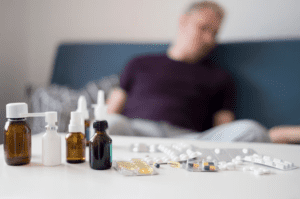Heavy alcohol use is defined as a pattern of alcohol consumption that exceeds recommended guidelines or poses a risk for alcohol-related problems. The definition of heavy alcohol use may vary depending on the country, organization, or agency that sets the guidelines. But it typically involves consuming a large quantity of alcohol over a short period or regularly consuming excessive amounts of alcohol. The specific thresholds for what constitutes heavy alcohol use may differ across guidelines, but in general, they include a number of drinks per day or per week that is above what is considered safe or moderate.
In the United States, the National Institute on Alcohol Abuse and Alcoholism (NIAAA) defines heavy alcohol use as consuming more than four drinks on any day for men or more than three drinks for women, or more than 14 drinks per week for men or more than seven drinks per week for women.
It’s important to note that heavy alcohol use can have serious negative consequences, including addiction, liver disease, high blood pressure, stroke, and certain types of cancer. If you’re concerned about your drinking, it’s important to seek help from a professional substance abuse treatment center.

Signs of Alcohol Abuse
For many people, alcohol is a part of their social lives and relaxation routines. However, for some, alcohol use can become problematic, leading to negative consequences in their personal and professional lives. While these individuals may not meet the diagnostic criteria for alcohol use disorder (AUD), they may still have a problematic relationship with alcohol.
People who fall into the “almost alcoholic” category may not have developed a physical dependence on alcohol, but they may still be at risk for negative consequences related to their drinking.
These individuals may have a pattern of drinking that falls short of the criteria for AUD, but still causes problems in their personal and professional lives. For example, they may drink to cope with stress, experience frequent hangovers, or have difficulty controlling their drinking. Recognizing problematic drinking patterns in “almost alcoholic” individuals can be challenging, as they may not see their drinking as a problem.
Signs of problematic drinking (alcohol abuse) can include
- Drinking to cope with stress or negative emotions
- Continuing to drink despite negative consequences (e.g., relationship problems, health issues, work performance)
- Difficulty controlling how much or how often they drink
- Experiencing blackouts or memory lapses from drinking
Feeling guilty or ashamed about their drinking
It is important to seek help early, which may involve speaking with a healthcare professional, attending a support group, or seeking treatment from an addiction center. With the right support, positive changes can be made to avoid the development of more severe alcohol problems.
What Is Drinking in Moderation?
Drinking in moderation refers to consuming alcohol in a responsible and controlled manner, while staying within the recommended guidelines for safe drinking. The guidelines for moderate drinking can vary between countries and organizations, but generally, it is defined as up to one drink per day for women and up to two drinks per day for men.
Moderate drinking is often associated with some health benefits, such as a reduced risk of heart disease and stroke, as well as lower levels of stress and anxiety. However, it is important to remember that alcohol is still an addictive substance and can have negative consequences, even in moderation.
When drinking in moderation, it is important to drink slowly, space out drinks, and stay aware of the amount of alcohol consumed. It is also important to avoid driving or engaging in any other activities that require alertness or coordination after drinking.
Food prevents alcohol from passing quickly into the small intestine. “When there is already food in your stomach, alcohol is absorbed more slowly,” says Dr. Panchagnula. “The longer alcohol stays in the stomach, the more slowly it is absorbed and the more slowly it affects the body.” Nursing a glass of wine with a meal will be less of a shock to your system than drinking on an empty stomach.
It is important to note that the definition of moderate drinking may not be appropriate for everyone, especially for people with certain medical conditions or those taking certain medications. Therefore, it is always best to consult with a healthcare professional or an addiction treatment specialist for professional help to determine what level of drinking is safe and appropriate for your individual situation.
Moderate Alcohol Consumption
Moderate alcohol consumption is defined as drinking up to one drink per day for women and up to two drinks per day for men, according to the U.S. Dietary Guidelines for Americans. This amount of alcohol is considered safe and may even have some health benefits, such as reducing the risk of CVD and stroke. However, it’s important to note that the risks associated with alcohol drinking can vary depending on a person’s age, gender, weight, and overall health.
In general, one standard drink is considered to be:
- Beer: 12 fluid ounces (355 milliliters)
- Wine: 5 fluid ounces (148 milliliters)
- Distilled spirits (80 proof): 1.5 fluid ounces (44 milliliters)
While moderate consumption is generally considered safe, it’s important to drink responsibly and avoid binge drinking, which is defined as consuming four or more drinks in a short period for women and five or more drinks for men. It can lead to a range of negative health consequences and risks, including alcohol poisoning, accidents, injuries, and risky behavior.
Drinking Heavily
Heavy drinking or excessive alcohol consumption is characterized by consuming excessive amounts of alcohol regularly or on a single occasion, surpassing the recommended guidelines for moderate drinking. The specific definition of “heavy drinking” can vary across countries and organizations, but it typically involves drinking more than 14 drinks per week for men, or more than 4 drinks on a single occasion, and more than 7 drinks per week for women, or more than 3 drinks on a single occasion. Most people who binge drink are not dependent on alcohol only. Binge drinkers are different from alcoholics.
Engaging in excessive drinking can lead to a variety of negative outcomes, including liver disease, cardiovascular disease, cancer, mental health issues, accidents, and social problems.

The Dangers of Continued Heavy Drinking
Continued excessive alcohol use can lead to a range of physical and mental health problems, such as depression or anxiety, as well as social and financial issues.
Some of the health risks associated with alcohol abuse can include liver disease, heart disease, high blood pressure, stroke, and certain types of cancers, including prostate cancer, breast cancer, liver cancer, oral cancer, and others.
Binge drinkers can also cause neurological problems such as memory loss and difficulty with coordination and balance. Mental health problems such as depression and anxiety can also be caused or exacerbated by it.
In addition to the health risks, continued heavy drinking can also have social and financial consequences. Heavy drinkers may experience relationship problems, difficulty maintaining employment, and financial instability. It can also increase the risk of accidents and injuries and can result in legal problems such as DUI charges.

Detox and Rehab For Alcohol Use Disorder at Rehab Centers
Detox and rehab programs at centers like Gloria Rehab Center are designed to assist individuals in overcoming alcohol dependence and attaining sustained sobriety. Beginning with medically supervised detoxification to manage withdrawal symptoms, these programs offer personalized treatment plans tailored to each individual’s needs. Whether through inpatient or outpatient programs, individuals receive counseling, therapy, and group support to develop coping mechanisms, establish a support network, and create a relapse prevention strategy. Ultimately, with the appropriate treatment and support, individuals can embark on a journey toward lasting recovery and enhance their overall quality of life.

